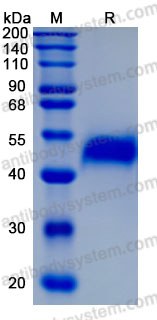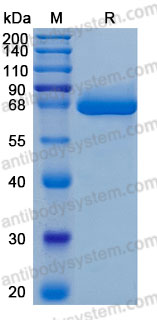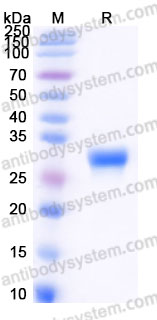Catalog No.
AHC00601
Biological activity
Measured by its binding ability in a functional ELISA. When recombinant human ApoH (Cat #: AHC00601) is immobilized at 2 μg/mL, 100 µL/well, the concentration of recombinant human LDL R that produces 50% of the optimal binding response is found to be approximately 0.2 ‑ 0.8 μg/mL
Expression system
Mammalian Cells
Species
Homo sapiens (Human)
Protein length
Gly20-Cys345
Nature
Recombinant
Endotoxin level
<0.1 EU/μg of the protein by the LAL method.
Purity
>90% as determined by SDS-PAGE.
Accession
P02749
Applications
Bioactivity, ELISA, Immunogen, SDS-PAGE, WB
Form
Lyophilized
Storage buffer
Lyophilized from a solution in PBS pH 7.4, 5% Trehalose, 5% Mannitol.
Reconstitution
Reconstitute in sterile water for a stock solution. A copy of datasheet will be provided with the products, please refer to it for details.
Shipping
In general, proteins are provided as lyophilized powder/frozen liquid. They are shipped out with dry ice/blue ice unless customers require otherwise.
Stability and Storage
Use a manual defrost freezer and avoid repeated freeze thaw cycles. Store at 2 to 8°C for one week. Store at -20 to -80°C for twelve months from the date of receipt.
Alternative Names
Beta-2-glycoprotein 1, APC inhibitor, Apo-H, Activated protein C-binding protein, Beta(2)GPI, Anticardiolipin cofactor, Beta-2-glycoprotein I, APOH, Apolipoprotein H, B2G1, B2GPI
Exploration of PDHA1-related prognostic genes in liver fibrosis., PMID:40489828
Environmental sulfur and molybdenum stress disrupts mineral homeostasis and induces physiological and molecular alterations in goats., PMID:40451414
Fructus arctii mitigates diabetic nephropathy via the Apoh/PPAR-γ pathway., PMID:40056629
Conditional deletion of Pink1 in mesenchymal stem cells suppresses osteogenesis through downregulation of Apoh transcription., PMID:39987848
Promising effects of Persian shallot extract on the serum markers and blood pressure of patients with metabolic syndrome: a double-blinded randomized controlled trial., PMID:39957163
Exploring Biomarkers to Predict Thrombogenic Risk in Pregnancy., PMID:39941603
Protection of β2GPI-deficient mice from thrombosis reflects a defect in PAR3-facilitated platelet activation., PMID:39869832
Unravelling the transcriptomic symphony of muscle ageing: key pathways and hub genes altered by ageing and caloric restriction in rat muscle revealed by RNA sequencing., PMID:39800693
Developing the biomarker panels and drugs by proteomic analysis for autoimmune uveitis and posterior scleritis., PMID:39687011
Heavy metal exposure and its effects on APOC3, CFAI, and ZA2G., PMID:39579699
Identification of plasma proteins binding oxidized phospholipids using pull-down proteomics and OxLDL masking assay., PMID:39566852
Plasma Proteomic Biomarkers in Alzheimer's Disease and Cardiovascular Disease: A Longitudinal Study., PMID:39409080
Integrative multi-omics summary-based mendelian randomization identifies key oxidative stress-related genes as therapeutic targets for atrial fibrillation and flutter., PMID:39359474
Quantitative proteomics combined independent PRM analysis reveals the mitochondrial and synaptic mechanism underlying norisoboldine's antidepressant effects., PMID:39358323
Serum apolipoprotein H determines ferroptosis resistance by modulating cellular lipid composition., PMID:39353906
Brain gene expression reveals pathways underlying nocturnal migratory restlessness., PMID:39341882
Identification of novel pQTL-SNPs associated with lung adenocarcinoma risk: A multi-stage study., PMID:39291803
Benchmark N-glycoproteomics study of common differential tissue and serum N-glycoproteins of patients with hepatocellular carcinoma., PMID:39182988
Immune dysregulation is an important factor in the underlying complications in Influenza infection. ApoH, IL-8 and IL-15 as markers of prognosis., PMID:39176097
Exploring Canine Mammary Cancer through Liquid Biopsy: Proteomic Profiling of Small Extracellular Vesicles., PMID:39061201
Dysregulation of Lipid Metabolism Serves as A Link Between Alzheimer's and Cardiovascular Disease, As Witnessed in A Cross-Sectional Study., PMID:39012677
Identification of Differentially Expressed mRNAs and lncRNAs Contributes to Elucidation of Underlying Pathogenesis and Therapeutic Strategy of Recurrent Implantation Failure., PMID:38955937
Genetics and Pathophysiological Mechanisms of Lipoprotein(a)-Associated Cardiovascular Risk., PMID:38879448
Integrative proteome analysis of bone marrow interstitial fluid and serum reveals candidate signature for acute myeloid leukemia., PMID:38866132
Ganoderic acid A ameliorates depressive-like behaviors in CSDS mice: Insights from proteomic profiling and molecular mechanisms., PMID:38723681
Designing a predictive Framework: Immune-Related Gene-Based nomogram and prognostic model for kidney renal papillary cell carcinoma., PMID:38493693
The protective effect of apolipoprotein H in paediatric sepsis., PMID:38291524
Circadian Regulation of Apolipoproteins in the Brain: Implications in Lipid Metabolism and Disease., PMID:38139244
Effects of apolipoprotein H downregulation on lipid metabolism, fatty liver disease, and gut microbiota dysbiosis., PMID:38101620
Identification of the key immune-related genes and immune cell infiltration changes in renal interstitial fibrosis., PMID:38027143
Analysis and Prediction of Significant Genes in Gastric Cancer Based on TCGA Database., PMID:38007771
Identification of Potential Drug Targets for Antiplatelet Therapy Specifically Targeting Platelets of Old Individuals through Proteomic Analysis., PMID:38001945
Comparative proteomic profiling of plasma exosomes in lung cancer cases of liver and brain metastasis., PMID:37770976
Multivessel Coronary Artery Disease Complicated by Diabetes Mellitus Has a Relatively Small Effect on Endothelial and Lipoprotein Lipases Expression in the Human Atrial Myocardium and Coronary Perivascular Adipose Tissue., PMID:37686357
Analysis of Plasma Proteins Involved in Inflammation, Immune Response/Complement System, and Blood Coagulation upon Admission of COVID-19 Patients to Hospital May Help to Predict the Prognosis of the Disease., PMID:37371071
The association of APOH and NCF1 polymorphisms on susceptibility to recurrent pregnancy loss in women with antiphospholipid syndrome., PMID:37243946
LC-MS/MS-Based Proteomics Approach for the Identification of Candidate Serum Biomarkers in Patients with Narcolepsy Type 1., PMID:36979356
BIOMARKERS: CAN THEY REALLY GUIDE OUR DAILY PRACTICE?, PMID:36867757
Apolipoprotein H induces sex-specific steatohepatitis and gut dysbiosis during chronic hepatitis B infection., PMID:36852272
Apolipoprotein H: a novel regulator of fat accumulation in duck myoblasts., PMID:36812035
Consolidation of metabolomic, proteomic, and GWAS data in connective model of schizophrenia., PMID:36747015
Characterization of a proteomic profile associated with organ dysfunction and mortality of sepsis and septic shock., PMID:36459524
Chromosomally Unstable Gastric Cancers Overexpressing Claudin-6 Disclose Cross-Talk between HNF1A and HNF4A, and Upregulated Cholesterol Metabolism., PMID:36430456
Accurate Diagnosis of COVID-19 from Self-Collectable Biospecimens Using Synthetic Apolipoprotein H Peptide-Coated Nanoparticle Assay., PMID:36399654
Identification of Specific Cervical Cancer Subtypes and Prognostic Gene Sets in Tumor and Nontumor Tissues Based on GSVA Analysis., PMID:36284631
Pursuing Diabetic Nephropathy through Aqueous Humor Proteomics Analysis., PMID:36211816
Bioinformatics prediction and experimental verification of key biomarkers for diabetic kidney disease based on transcriptome sequencing in mice., PMID:36157062
Application of Micro-Western Array for Identifying Different Serum Protein Expression Profile among Healthy Control, Alzheimer's Disease Patients and Patients' Adult Children., PMID:36138870
Alcohol-dependent downregulation of apolipoprotein H exacerbates fatty liver and gut microbiota dysbiosis in mice., PMID:36123743
Analysis of the Relationship between the Expression Level of TTR and APOH and Prognosis in Patients with Colorectal Cancer Metastasis Based on Bioinformatics., PMID:36101808



